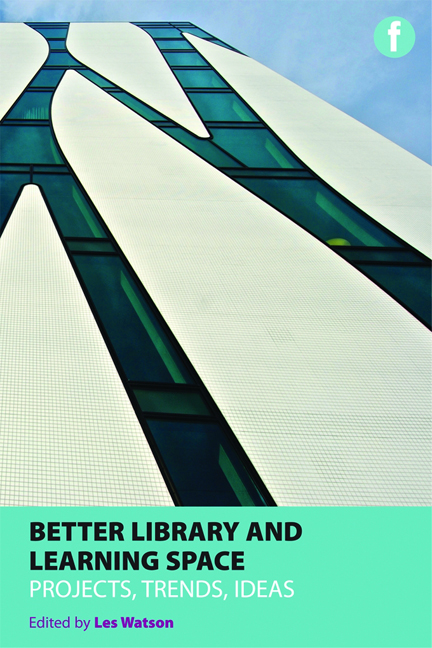Introduction – about this book
Published online by Cambridge University Press: 08 June 2018
Summary
Scope
This is a book for anyone interested in libraries and their learning space – what exists, why it continues to be important and what really matters when planning it. The focus is on learning space in libraries that is used for learning outside the classrooms of educational organization and by personal learners in public libraries, generally referred to as informal learning space. In addition to some ideas on built space (the what), consideration is given to ideas and concepts that underpin current library learning spaces and that will inform future ones (the why and the how). ‘New old space’ – space that fails to experiment with new ideas and ways of working – is a common phenomenon in all types of building and libraries are no exception to this. McDonald (2006) identifies an intangible ‘oomph’ (or I prefer ‘wow’) factor as one of the important criteria in the quality of new library space. Creating a space that works from the day it opens is obviously important but adding that ‘wow’ to create new spaces that inspire the library community its readers, learners and staff is more challenging. Tomorrow's library and learning spaces are waiting to be invented so focusing on the future and emphasizing what libraries and learning spaces could be, what matters when we are thinking about and planning these new spaces, how spaces might be used, and how they can attract, support and inspire those who use them is fundamentally important.
The way a space is designed and configured can enable (or disable) a wide range of activities and the services it can provide – space and service are inseparable, and it can be argued that the provision of space is a service in its own right. As service provision is dependent on the amount, type and organization of the spaces in a library then service delivery approaches and the portfolio of services and support provided are inevitably linked to space development. While library services are not the focus of this book, several authors touch on service issues.
Libraries have always also been places of learning. Ideas about learning, our understanding of learning processes and the impact of technology on learning have all changed considerably in recent years and require us to rethink how we organize and manage libraries and their learning spaces.
- Type
- Chapter
- Information
- Better Library and Learning SpaceProjects, trends and ideas, pp. xix - xxviPublisher: FacetPrint publication year: 2013



